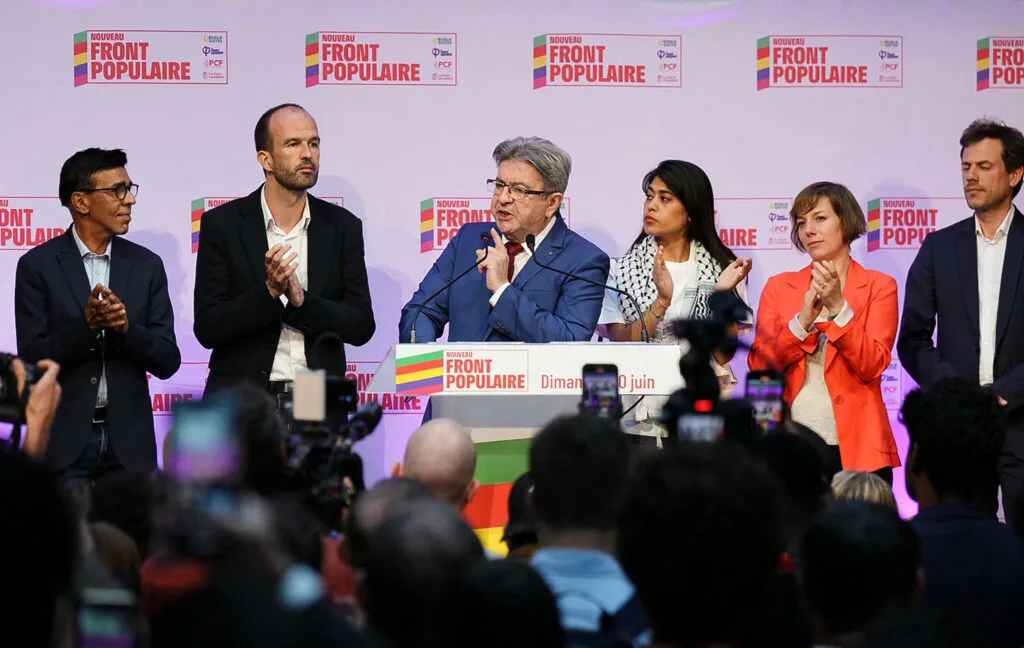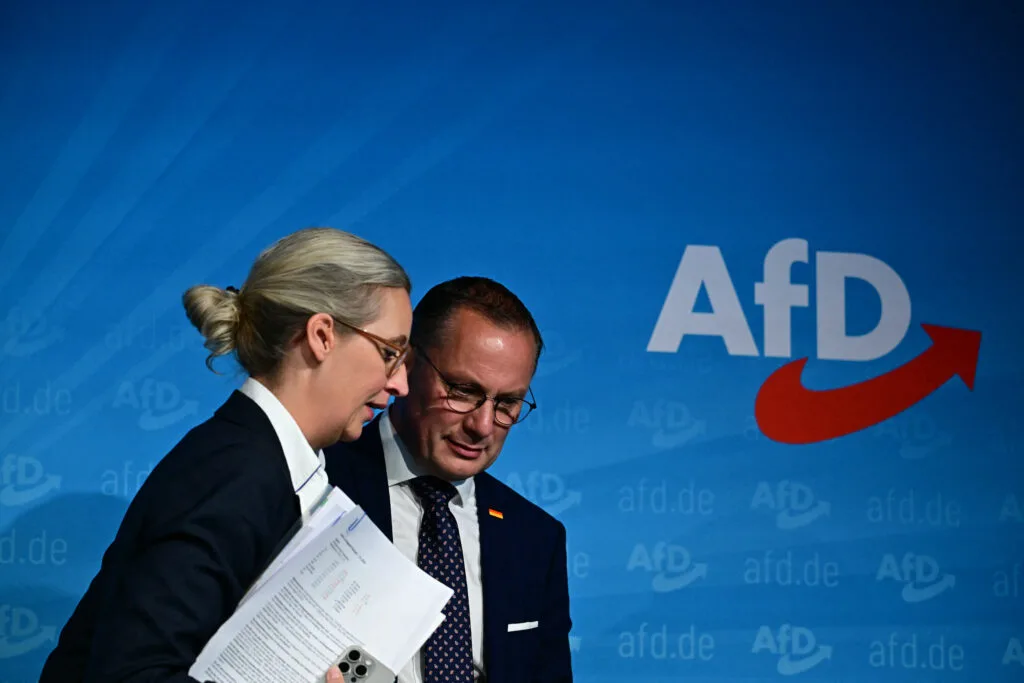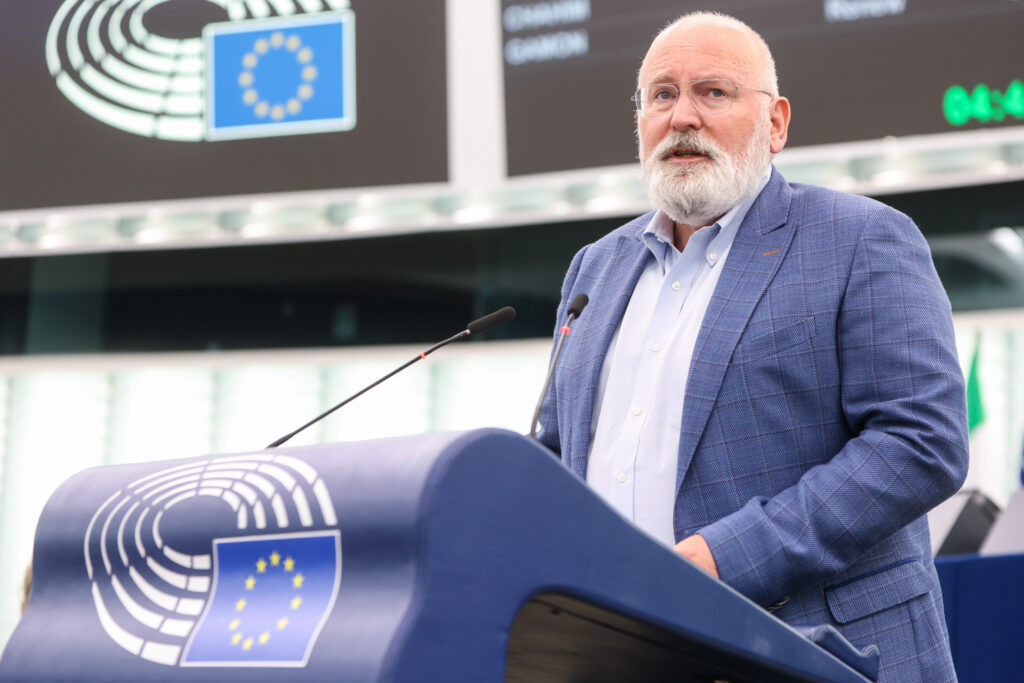Brussels – A united progressive front, holding together social democrats and environmentalists. This is the recipe of former European Commission executive vice-president Frans Timmermans to bring the centre-left back to a position of “relevance,” capable of influencing policies not only at the national level but across the entire continent and stopping the rise of the far right. Starting with the defence of the Green Deal, which he himself dealt with in his Berlaymont days and which must be the basis of EU industrial policy. However, the Popular allies seem to have more than a few second thoughts.
A European “wide field”?
That social democracy is not doing well in Europe is hardly news. But no one seems to have ready a solution to reverse the trend. With the exception, perhaps, of Frans Timmermans. The former number two to Ursula von der Leyen between 2019 and 2023 suggested this morning (Feb. 5) during a press point at the Europarliament in Brussels that “consolidating progressive left-wing forces is necessary to have more weight and volume,” a prerequisite for “advancing our political battles” in the member states and throughout the Union.
The model to be inspired by is one he himself is testing in the Netherlands—where in November 2023, he led an electoral alliance between Socialists and Greens called the GroenLinks-PvdA (Gl/PvdA), coming second behind the populist radical right wing of Partij voor de Vrijheid (PVV) of Geert Wilders—and which he would now like to become a single party.
It is clear that not all countries have the ideal conditions to achieve immediate results in this regard, and the former vice president also knows this. “There is certainly not a one-size-fits-all solution in every state: in some states, the Greens grew out of social democratic movements, but in other countries, they have a different history,” he conceded. One need only think of France, where a similar attempt to bring together the varied souls of the left in the Nouveau front populaire (NFP) seems to be creaking dangerously, having run out of the urgency that had brought it into being last summer as an electoral cartel.

Or to the less-than-flattering results of the infamous “wide field” in Italy, which still has not managed to overcome the albeit legitimate differences between its components. Another difference with the Italian case is that, unlike the Green-Left Alliance (AVS), the Dutch Gl/PvdA, which the former commissioner took as a model, includes social democratic forces in addition to ecologists, not those of the radical left.
However, Timmermans reiterated, “If we want to be strong on the left, we need to be more united.” But that’s not enough: “We also have to make a proposal to the centre that will attract other parties to form coalitions with us.” “Our relevance” within a democratic and parliamentary framework also derives from our proposals and our willingness to cooperate with other democratic parties to realise change.”
In short, it is time to “look at what we have in common and overcome our differences” with the goal of “reinventing a basic idea of justice and solidarity in our society,” he stressed, citing as an example the founding in 2007 of our own Democratic Party (PD) which, after the ulivist season, was born with the promise of reuniting in a single political entity the different currents of progressivism at the time.
Right turn
Whether it succeeds or not, however, it appears to be a manoeuvre that, rather than proactive, appears essentially reactive. And what sets it in motion is the political disruption taking place across the Old Continent: “If the centre-right starts imitating the radical right, the radical right wins, and the centre-right loses,” Timmermans certifies. At that point, he adds, “The centre-right that loses and is drawn into the sphere of the radical right abandons the centre, which makes it much more difficult for other centre-left or centre-right parties to form coalitions that can carry our countries and our Europe into the future.”

This is precisely what is occurring in Germany, where the competition between the Christian Democratic Union (CDU/CSU) of Friedrich Merz with the ultra-right post-Nazis of Alternative für Deutschland (AfD) led by Alice Weidel and Tino Chrupalla is leading the party that was formerly Angela Merkel‘s—the chancellor of the “Wir schaffen das“, the “we can do it” with which she opened the doors to over a million Syrian refugees—to shift to increasingly radical positions on security and immigration control.
“I thought the German centre-right had learned” not to cooperate with the far-righ# is the bitter comment of Timmermans, who branded as a “tragic mistake” the (failed) attempt by the likely new Bundeskanzler Merz to play hand-in-hand with the AfD, breaking the octogenarian tradition of the “cordon sanitaire.”
Green deal and industrial policy
But Timmermans was, above all, responsible for the Green deal during his tenure at the European Commission. That “Green Deal” that, he recalled, “represents our industrial policy,” whatever name he wants to give it in the von der Leyen bis. Provided, of course, that “we maintain the policy lines agreed upon” in the previous legislature without attacking its regulatory framework.
Pity that this is what the European People’s Party has been doing for several months now, both in Strasbourg (where they have already launched the attack on some key green legislation measures) and in Brussels, where, under the guise of competitiveness, a simplification phase that smacks very much of “deregulation” is being initiated. The statements of one of the heavyweights in the EPP, Polish Prime Minister Donald Tusk, that “the revolt against regulation is inevitable” leave little doubt in this regard.
The revolt against regulation is inevitable! Whether someone in the EU likes it or not. The time is now!
– Donald Tusk (@donaldtusk) February 4, 2025
But Timmermans deplores this politicisation: “The Green Deal was neither left-wing nor right-wing; it was the right thing,” he noted, recalling that in the last legislature, the EPP had not only made it possible but “often claimed it as its own project,” while now “it has allowed itself to be tempted by the radical right” by turning it into the terrain of a fierce ideological battle. The Old Continent, says the Dutch politician, needs “lower energy prices” to become competitive again and “recreate a platform for European industry of the future.” And the only way to achieve this is to “accelerate the transition to renewable energy.”
As for the deep crisis in the automotive sector, the underlying problem is that “Europe’s automotive industry, particularly the large German manufacturers, thought that the combustion engine had an infinite future” and, therefore, lagged far behind global rivals, especially China, where “electric cars were not only becoming mass-produced but were also becoming cheaper and cheaper.” So, he argued, it is anachronistic to imagine postponing the stop to the endothermic engine (currently scheduled for 2035), as the right-wingers are demanding, because we need to aim “toward zero-emission vehicles.”
Funding for NGOs
Finally, the former commissioner responded to a question about the (essentially media) case mounted by the EPP about alleged opaque funding of environmental NGOs by the EU executive, which, according to the allegations—for now without any factual basis—were made by him in contravention of the rules governing lobbying activities in Brussels and undermining the independence of the Commission, which allegedly acted as a political actor to influence the legislative process upstream.

“I always worked well with the Green10 group,” he said, referring to the coalition of ten of the largest environmental organizations and networks active at the European level. “They would come to my office, express their opinions, and most of the time they would criticize me heavily” because they claimed that the Commission’s ambition “was not enough”. But “that’s their job, that’s what NGOs do,” Timmermans continued.
If anything, he added, the Life program (from which EU funding for NGOs comes) “was the responsibility of another commissioner” who came right from the EPP, the Austrian Johannes Hahn, who in the first von der Leyen College was in charge of the budgetary portfolio. Therefore, Timmermans concluded, “I have never had any influence on NGO funding.”
English version by the Translation Service of Withub







